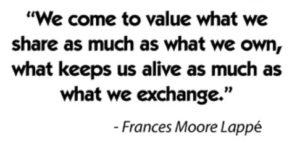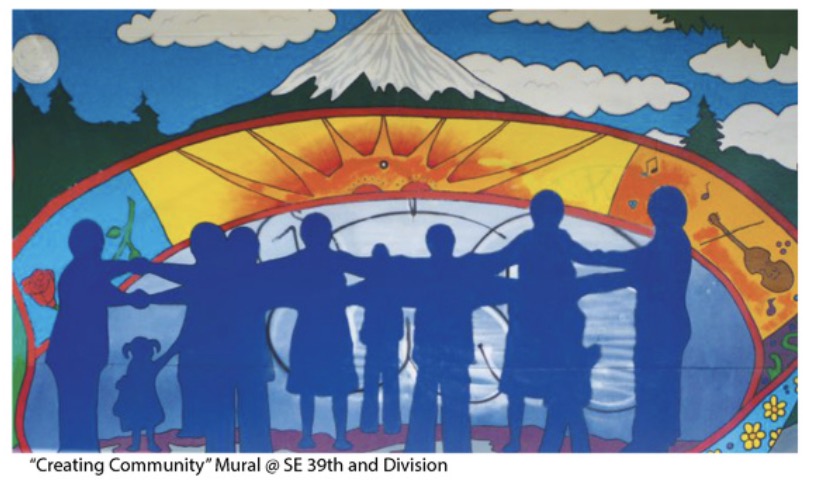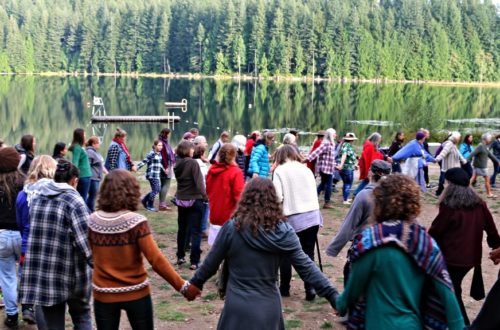You’re in need of a tool to finish a project and really don’t want to buy an item you’ll seldom use again. You have so many chores to do at home that you feel overwhelmed, and stop before you even get started. You have never-used things at home that you don’t need any more, and you know that someone else would love to have them, but how do you connect with those folks? You’re an older person of limited income who needs help getting the big old television to the recycler. Or you want to feed your family well, but with a full-time job, you have little time to cook.
All of these scenarios and many more similar situations happen all the time. Too often it feels like there are no solutions. But wait! That’s where community comes in.
• Tool libraries exist where neighbors can pay a small membership fee for access to the collection of tools rather than having to purchase one. (Search online for the libraries in the your area)
• For ten years, we belonged to a work party. Once a month we’d go to one of the member’s home to do whatever chores needed to be done for three hours, then we’d have a potluck. (We took our own plates, utensils, and napkins along so the host had less to clean up.) We not only got lots of work done, we got to know each other well as we chatted while working. This is how we got our windows washed every year!
• If you have things you want to share or need, two methods I personally have connected with are: NextDoor.com and Buy Nothing Project (buynothingproject.org). One of the things I really like about NextDoor is that neighbors post about situations, like a missing pet, and all the neighbors watch for the animal. (Ed. Note – Check out Rooster – http://portland.therooster.co/)
• Older people, especially those who live alone, can have a difficult time dealing with seemingly small problems. That’s where the Village to Village movement comes in. The aim is to help older people age in place which is beneficial for so many reasons. http://villagesnw.org/why-villages-why-now/
• You can start a cooking group with other friends. One weekend day, each member makes enough of one dish to provide a main dish for each family, like a large pot of chili. When you meet and exchange food, your main dishes for the week will be care of!
Other examples that pop into mind are Farmer’s Markets and Community  Supported Agriculture (CSAs). Members of a CSA pay the farmer a fee at the beginning of the growing season, guaranteeing the farmer has the necessary funds for seeds, etc, and then they are rewarded with a share of the harvest. There are toy libraries (and online toy exchanges), kitchen tool libraries, in addition to our wonderful regular libraries. Also clothing exchanges to which one brings along items no longer worn; the leftovers can be donated to a charity – this is how I got a wonderful, luxurious scarlet cashmere turtleneck. Notice that all of these examples are person-to-person, as opposed to impersonal exchanges for money; in fact, most of them don’t involve money at all.
Supported Agriculture (CSAs). Members of a CSA pay the farmer a fee at the beginning of the growing season, guaranteeing the farmer has the necessary funds for seeds, etc, and then they are rewarded with a share of the harvest. There are toy libraries (and online toy exchanges), kitchen tool libraries, in addition to our wonderful regular libraries. Also clothing exchanges to which one brings along items no longer worn; the leftovers can be donated to a charity – this is how I got a wonderful, luxurious scarlet cashmere turtleneck. Notice that all of these examples are person-to-person, as opposed to impersonal exchanges for money; in fact, most of them don’t involve money at all.
Another aspect of community that is less often thought of is what Frances Moore Lappé addresses in her book EcoMind: Changing the Way We Think to Create the World We Want. She says that in community, “We come to value what we share as much as what we own, what keeps us alive as much as what we exchange.”
Master Recycler and waste reduction advocate Betty Shelley, and her husband, Jon, have filled only one 35-gallon can of garbage per year since 2006. In her three-session class, “Less is More: Getting to One Can of Garbage a Year”, Betty Shelley teaches her techniques for reducing waste and why that’s so important.
Visit Betty on Facebook @reduceyourwasteproject
For more info: www.reduceyourwasteproject.com






